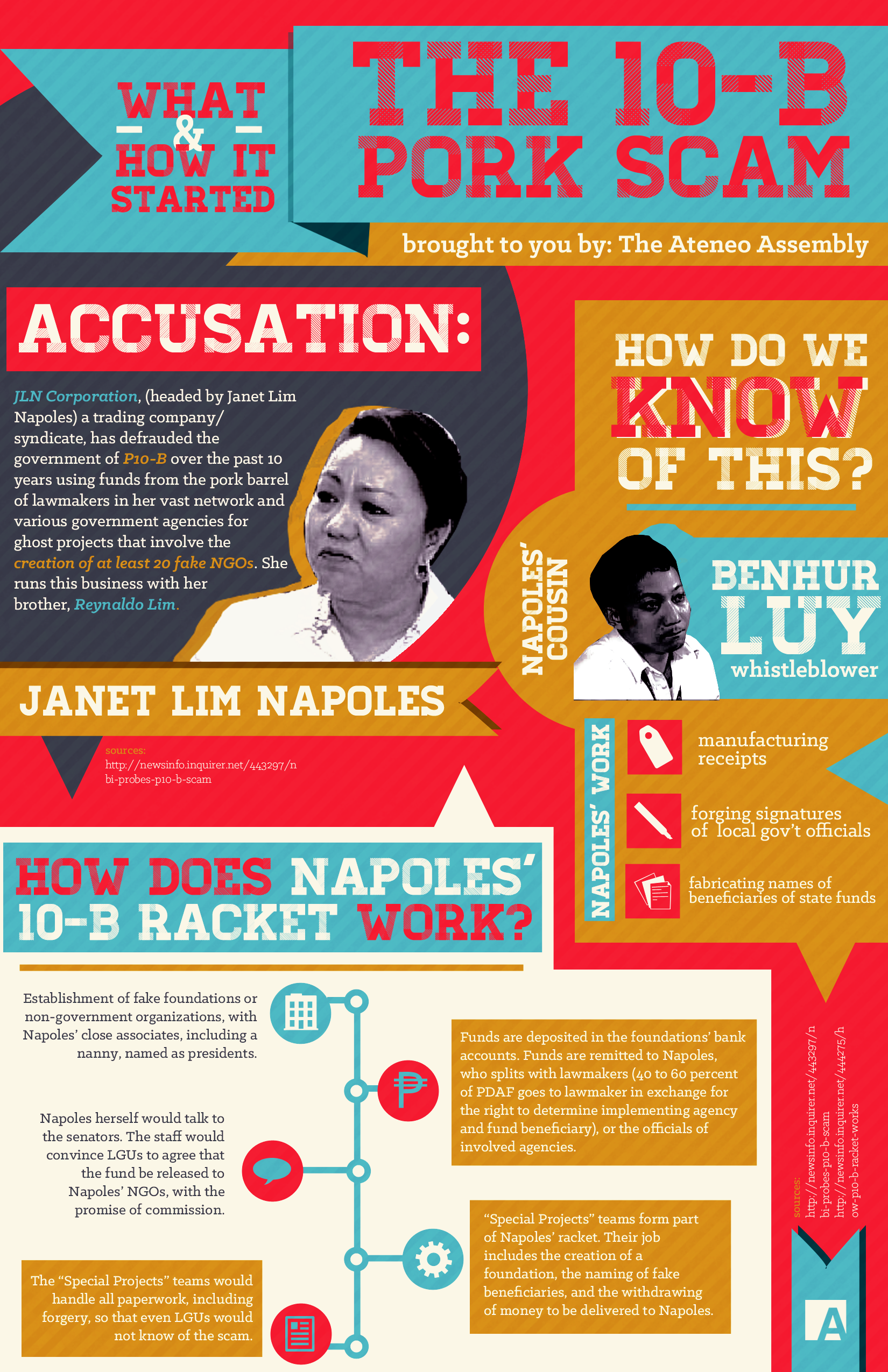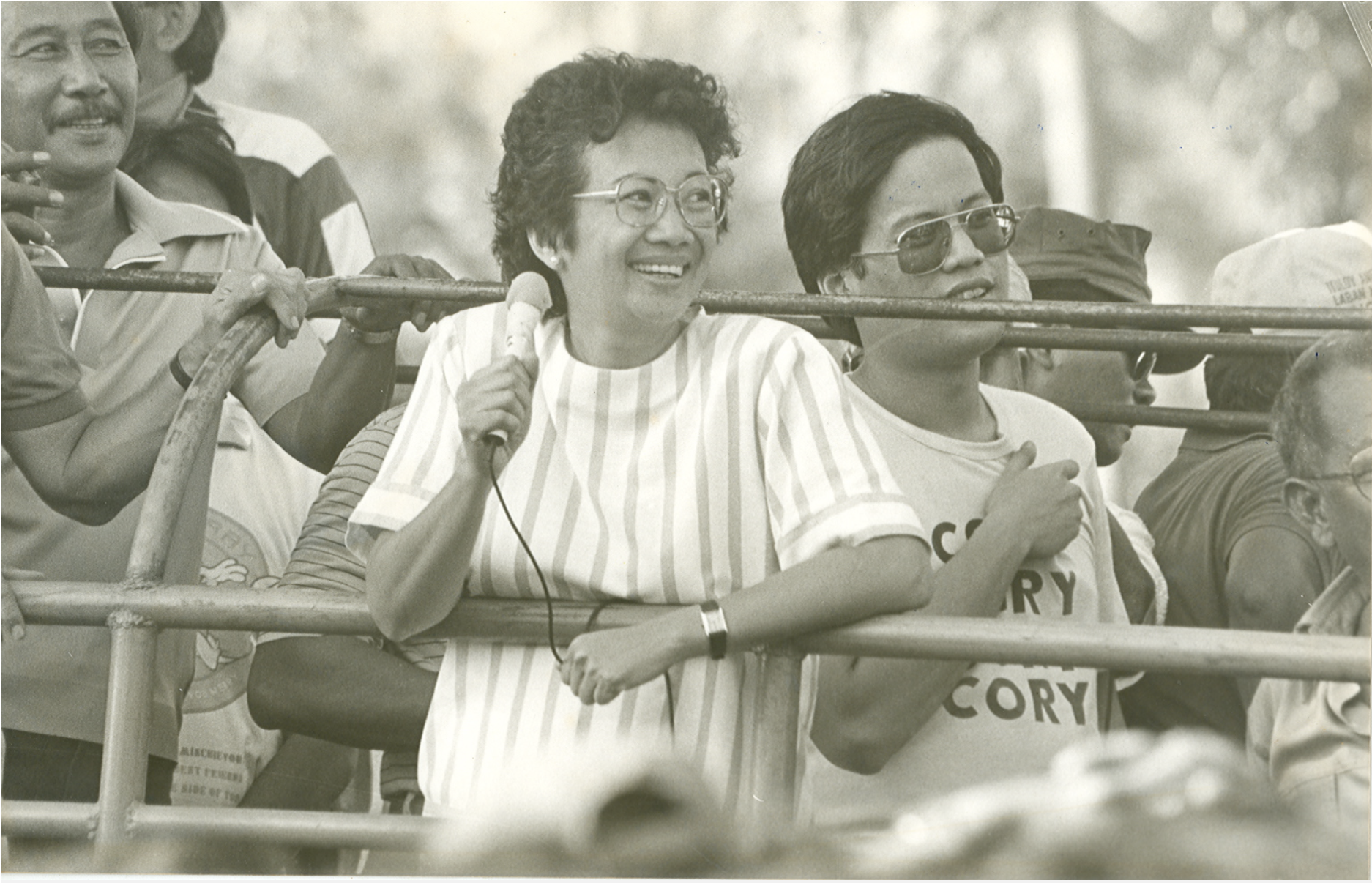|
Disbursement Acceleration Program
The Disbursement Acceleration Program in the Philippines is a "special" budget allocated to accelerate or hasten a government project without Congress or Senate's approval. This replaces the traditional pork barrel, the Priority Development Assistance Fund (PDAF), after the Pork barrel scam was uncovered in 2013. History During President Benigno Aquino III's term, he instituted budget reforms, as opposed to Gloria Macapagal Arroyo's style of spending funds. Due to the reforms, he reduced funds in some, added a little in some, and the rest is reserved for emergencies like disasters and crisis management and foreign debts and deficits. The consequence is a lot of funds unspent, slower fund release and sometimes, underspent funds were returned to the National Treasury. In order to solve the problem, the President, along with his budger secretary and fellow Liberal party member Florencio Abad, instituted a program that accelerates fund spending in all public works and agencies badly n ... [...More Info...] [...Related Items...] OR: [Wikipedia] [Google] [Baidu] |
Pork Barrel
''Pork barrel'', or simply ''pork'', is a metaphor for the appropriation of government spending for localized projects secured solely or primarily to bring money to a representative's district. The usage originated in American English, and it indicates a negotiated way of political particularism. Political science Scholars use it as a technical term regarding legislative control of local appropriations. In election campaigns, the term is used in derogatory fashion to attack opponents. Typically, "pork" involves national funding for government programs whose economic or service benefits are concentrated in a particular area but whose costs are spread among all taxpayers. Public works projects, certain national defense spending projects, and agricultural subsidies are the most commonly cited examples. Citizens Against Government Waste outlines seven criteria by which spending in the United States can be classified as "pork": # Requested by only one chamber of Congress # ... [...More Info...] [...Related Items...] OR: [Wikipedia] [Google] [Baidu] |
Priority Development Assistance Fund
The Priority Development Assistance Fund (PDAF) was a discretionary fund in the Philippines available to members of Congress. Originally established as the Countrywide Development Fund (CDF) in 1990, it was designed to allow legislators to fund small-scale infrastructure or community projects which fell outside the scope of the national infrastructure program, which was often restricted to large infrastructure items. The PDAF was commonly called the "pork barrel", and was the subject of much public criticism following exposés on abuses perpetuated by members of Congress on use of the fund in 1996 and 2013. On November 19, 2013, the Supreme Court declared the PDAF unconstitutional, thereby abolishing it. See also * People's Initiative Against Pork Barrel * Priority Development Assistance Fund scam * Padrino System * Disbursement Acceleration Program References External linksPDAF portalat the website of the Department of Budget and Management The Department of Budget and ... [...More Info...] [...Related Items...] OR: [Wikipedia] [Google] [Baidu] |
Pork Barrel Scam
The Priority Development Assistance Fund scam, also called the PDAF scam or the pork barrel scam, is a political scandal involving the alleged misuse by several members of the Congress of the Philippines of their Priority Development Assistance Fund (PDAF, popularly called "pork barrel"), a lump-sum discretionary fund granted to each member of Congress for spending on priority development projects of the Philippine government, mostly on the national level. The scam was first exposed in the ''Philippine Daily Inquirer'' by Nancy C. Carvajal on July 12, 2013, with the six-part exposé of Carvajal pointing to businesswoman Janet Lim-Napoles as the scam's mastermind after Benhur K. Luy, her second cousin and former personal assistant, was rescued by agents of the National Bureau of Investigation (NBI) on March 22, 2013, four months after he was detained by Napoles at her unit at the Pacific Plaza Towers in Bonifacio Global City. Initially centering on Napoles' involvement in the 20 ... [...More Info...] [...Related Items...] OR: [Wikipedia] [Google] [Baidu] |
Benigno Aquino III
Benigno Simeon Cojuangco Aquino III (; February 8, 1960 – June 24, 2021), also known as Noynoy Aquino and colloquially as PNoy, was a Filipino politician who served as the 15th president of the Philippines from 2010 to 2016. The son of assassinated politician Benigno Aquino Jr. and 11th president Corazon Aquino, he was a fourth-generation politician as part of the Aquino family of Tarlac. Benigno Aquino III previously served as a member of the House of Representatives and Senate from 1998 to 2010, and also as a deputy speaker of the House of Representatives from 2004 to 2006. On September 9, 2009, shortly after the death of his mother, he announced his candidacy in the 2010 presidential election, which he eventually won. He was sworn into office as the 15th president of the Philippines on June 30, 2010, succeeding Gloria Macapagal Arroyo. [...More Info...] [...Related Items...] OR: [Wikipedia] [Google] [Baidu] |
Gloria Macapagal Arroyo
Maria Gloria Macaraeg Macapagal Arroyo (, born April 5, 1947), often referred to by her initials GMA, is a Filipino academic and politician serving as one of the Deputy Speaker of the House of Representatives of the Philippines, House Deputy Speakers since 2022, and previously from 2016 to 2017. She previously served as the List of presidents of the Philippines, 14th president of the Philippines from 2001 until 2010. She is the longest serving president of the Philippines since Ferdinand Marcos. Before her accession to the presidency, she served as the List of vice presidents of the Philippines, 10th vice president of the Philippines from 1998 to 2001 under President Joseph Estrada, making her the country's first female vice president, despite having run on an opposing ticket. She was also a Senate of the Philippines, senator from 1992 to 1998. After her presidency, she was elected as the House of Representatives of the Philippines, representative of Pampanga's Pampanga's 2nd cong ... [...More Info...] [...Related Items...] OR: [Wikipedia] [Google] [Baidu] |
Florencio Abad
Florencio "Butch" Barsana Abad (born July 13, 1954) is a Filipino lawyer and politician. Having held many cabinet-level ranks in the past, he was appointed by President Benigno Aquino III as Secretary of the Philippine Department of Budget and Management.Noynoy names Cabinet execs, senior government officials Abad held various cabinet-level positions in the past, particularly as Secretary of the and Secretary of the |
Renato Corona
Renato Tereso Antonio Coronado Corona (October 15, 1948 – April 29, 2016) was a Filipino judge who was the 23rd chief justice of the Philippines from 2010 to 2012. He served as an Associate Justice of the Supreme Court of the Philippines, associate justice after being appointed by President Gloria Macapagal Arroyo on April 9, 2002, and later as Chief Justice on May 12, 2010, upon the retirement of Chief Justice Reynato Puno. Corona was previously a law professor, private law practitioner and member of the Cabinet of the Philippines, Cabinet under former presidents Fidel V. Ramos and Gloria Macapagal Arroyo before being appointed to the high tribunal. On July 5, 2011, the Supreme Court, headed by Corona, issued a landmark decision on the ''Hacienda Luisita'' case, wherein, under agrarian reform laws, the Court upheld both the distribution of land to the hacienda's farm workers and the revocation of the SDO agreement forged in 1989. Hacienda Luisita is a plantation that was con ... [...More Info...] [...Related Items...] OR: [Wikipedia] [Google] [Baidu] |
Politics Of The Philippines
The politics of the Philippines take place within a three-branch governmental system. The country is a democracy, led by a directly elected president who serves as both the head of state and the head of government. The president heads the executive branch, and has significant political powers. Presidents are limited to a single six-year term of office. The bicameral Congress serves as the legislature, consisting of the small Senate, elected on an at-large basis throughout the country, and the larger House of Representatives, primarily made up of representatives elected from specific geographic regions. The judiciary is headed by the Supreme Court of the Philippines, a body with expansive powers of review over actions taken by other political and administrative bodies. The legal system is a mixture of civil and common law, influenced by the prior rule of both Spain and the United States. Spanish rule relied heavily on local intermediaries, setting up a system dominated by elites ... [...More Info...] [...Related Items...] OR: [Wikipedia] [Google] [Baidu] |





